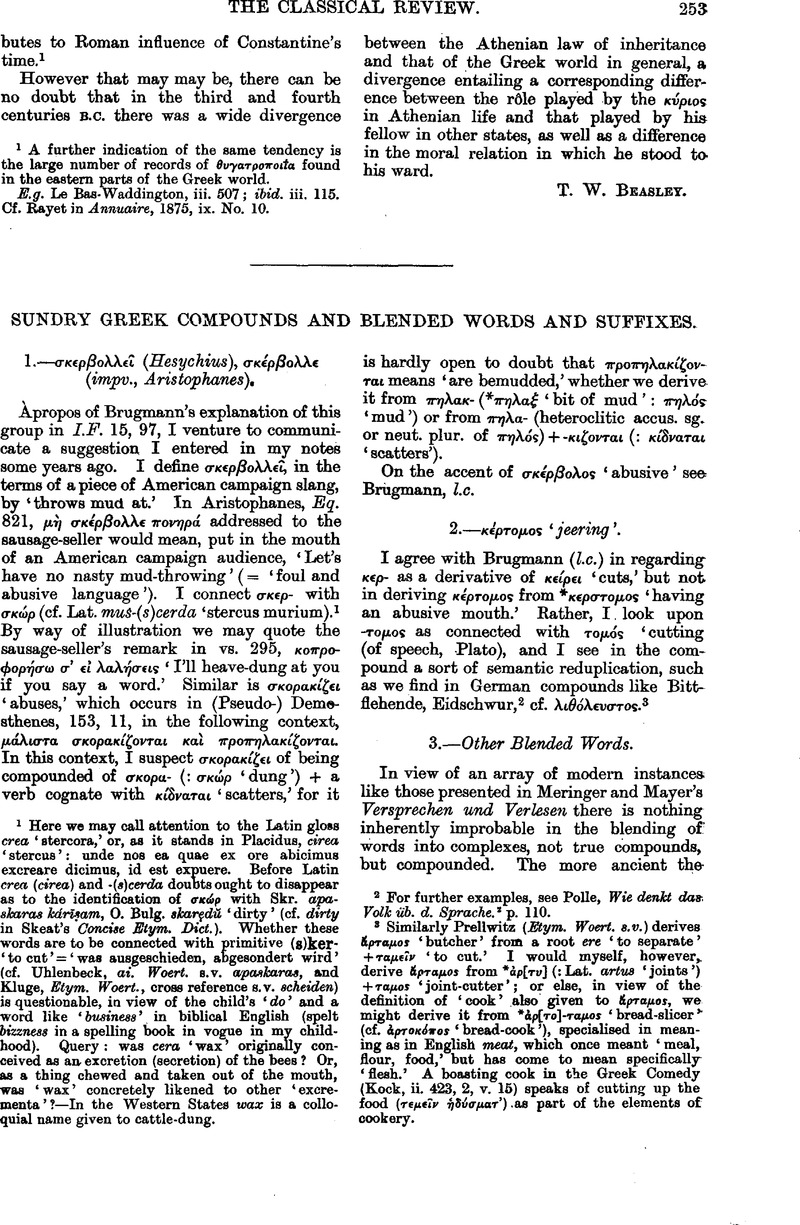No CrossRef data available.
Article contents
Sundry Greek Compounds and Blended Words and Suffixes
Published online by Cambridge University Press: 27 October 2009
Abstract

- Type
- Original Contributions
- Information
- Copyright
- Copyright © The Classical Association 1906
References
page 253 note 1 Here we may call attention to the Latin gloss crea ‘stercora,’ or, as it stands in Placidus, cirea ‘stercus’: unde nos ea quae ex ore abicimus excreare dicimus, id est expuere. Before Latin crea (cirea) and (s)cerda doubts ought to disappear as to the identification of δκώρ with Skr. apaskaras kárīsam, 0. Bulg. skarẹdŭ ‘dirty’ (cf. dirty in Skeat's Concise Etym. Dict.). Whether these words are to be connected with primitive (S)ker ‘to cut’ = ‘was ausgeschieden, abgesondert wird’ (cf. Uhlenbeck, ai. Woert. s.v. apaskaras, and Kluge, Etym. Woert., cross reference s.v. scheiden) is questionable, in view of the child's ‘do’ and a word like ‘business’ in biblical English (spelt bizzness in a spelling book in vogue in my childhood). Query: was cera ‘wax’ originally conceived as an excretion (secretion) of the bees ? Or, as a thing chewed and taken out of the mouth, was ‘wax’ concretely likened to other ‘excrementa’ ?—In the Western States wax is a colloquial name given to cattle-dung.
page 253 note 2 For further examples, see Polle, , Wie denkt das Volk üb. d. Sprache.z p. 110.Google Scholar
page 253 note 3 Similarly Prellwitz (Etym. Woert. s.v.) derives ἄρταμος ‘butcher’ from a root ere ‘to separate’ +ταμεν ‘to cut.’ I would myself, however derive ἄρταμος from *ρ[τυ] (:Lat. artus ‘joints’) + ταμος ‘joint-cutter’; or else, in view of the definition of ‘cook’ also given to ἄρταμος, we might derive it from *ρ[το]-ταμος ‘bread-slicer’ (cf. ρτοκπος ‘bread-cook’), specialised in meaning as in English meat, which once meant ‘meal, flour, food,’ but has come to mean specifically ‘flesh.’ A boasting cook in the Greek Comedy (Kock, ii. 423, 2, v. 15) speaks of cutting up the food (τ7epsi;μεν δσματ') as part of the elements of cookery.
page 254 note 1 Since this was written Fick in B.B. 28, 102 expressly derives ψηλαφᾷ from ψηλ, the aorist of ψλλω, + φᾷ.
page 254 note 2 Since this was written Fick (l.c. p. 103) makes φλναφος a compound of φληνο + a derivative φω and defines by ‘geschwätz anknüpfender.’
page 254 note 3 As though from Gr. πρτος and πρμος a blend (*ποτομος Skr. prathamäs) had been made.
page 255 note 1 Hirt, Griech. Gram. § 354, writes, ápropos of the suffix -tero-: eine entscheidung über die verschiedenen ansichten wäre nur zu gewinnen, wenn es möglich wäre, die etymologie des suffixes -tero- nachzuweisen. I take it that underlying these words the author intimates the hope that a satisfactory meaning will yet be discovered for the suffix -tero-.
page 255 note 2 In the Greek inscriptions τμος ‘piece of land’ is found (cf. Liddell and Scott).
page 255 note 3 V. Salva in thei Nuevo Diccionario de la Lengua Castellana por la Academia Española defines Spanish tercero ‘third (person)’ by (1) ‘mediator, internuntius,’ (2) ‘tertius arbiter.’
page 255 note 4 Sommer, Lat. Gram. § 142 also writes *tri-Stis, but his note is so abbreviated one cannot infer whether he derives *tri-stis from ‘three’ or not.


